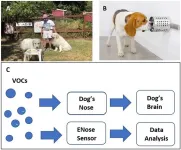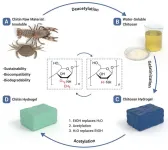(Press-News.org) Consumers in the richer, developed nations will have to accept restrictions on their energy use if international climate change targets are to be met, warn researchers.
The big challenge is to identify the fairest and most equitable way that governments can curtail energy use, a process known as energy demand reduction.
Writing in the journal Nature Energy, the research team - led by Milena Büchs, Professor of Sustainable Welfare at the University of Leeds - analysed several scenarios to identify a potential solution.
One option is to cap the top 20% of energy users while allowing those people who use little energy and have poverty-level incomes to be able to increase their consumption levels and improve their quality of life.
Setting the energy use cap
Across any population there will be a range - or distribution - of values for how much energy individuals use. The values are sorted into 100 percentiles - for example, the 50th percentile represents the value that is exactly in the middle of the energy distribution, which half the population fail to reach and the other half exceeds.
Under the energy demand reduction scheme, the top-level energy users would see their energy use restricted to the value of energy use at the 80th percentile. In the scenario modelled, that would be 170.2 Giga Joules (GJ) per person per year, compared to the mean energy use of the top 20% of consumers of 196.8 GJ per person per year.
Using data from 27 European states, the researchers modelled how effective this energy demand reduction strategy would be. They found it would cut greenhouse gas emissions by 11.4% from domestic energy sources; 16.8% from transport and 9.7% from total energy consumption.
Allowing people in poverty to increase their energy use would reduce these emissions savings by relatively small amounts - 1.2 percentage points for domestic energy; 0.9 for transport; and 1.4 for total energy consumption. It would enable the less well-off to meet unmet needs, perhaps where they may have been unable to adequately heat their home.
Professor Büchs said: “Policymakers need to win public support for energy demand reduction mechanisms. The reality is decarbonisation on the supply side, where energy is generated and distributed, will not be enough to deliver the emission reductions that are needed.
“So, energy demand will have to be reduced. That is the inescapable reality. Experts on the UN’s Intergovernmental Panel on Climate Change estimate that reducing energy demand could produce between 40% and 70% of the emissions reductions that need to be found by 2050.
“Our research is indicating that public support for energy demand reduction is possible if the public see the schemes as being fair and deliver climate justice.”
The data in the study was collected as part of the 2015 European Household Budget Survey from 275,614 households. Household expenditure and data from the Exiobase dataset were used as proxies for energy use and emissions.
Public support
As part of the study, the research team also held focus groups with the public to gauge people’s responses to different policy interventions to reduce energy use. Quotas on flights and car mileage were seen by some respondents as attacks on freedom and choice.
Conversely, other people supported a ban on activities beyond a certain level, say for business or personal flights.
There was a recognition that there is a climate emergency and the problem needs to be tackled urgently.
Writing in the journal, the researchers noted: “Several participants acknowledged that regulations that limit ‘luxury’ energy use would treat everyone equally and therefore fairly, which can be conducive to acceptance if good reasons are provided, as travel and other restrictions during the COVID-19 pandemic have demonstrated.”
Targeting ‘luxury’ energy use would be seen to treat everyone fairly and equally and that could soften any opposition to energy demand mechanisms.
The paper "Emissions savings from equitable energy demand reduction" can be downloaded from the Nature Energy website when the embargo lifts. The authors are: Milena Büchs, Noel Cass, Caroline Mullen, Karen Lucas and Diana Ivanova.
END
END
Cap top 20% of energy users to reduce carbon emissions
2023-07-17
ELSE PRESS RELEASES FROM THIS DATE:
Excess mortality with Alzheimer disease and related dementias as an underlying or contributing cause during pandemic
2023-07-17
About The Study: This study found that large increases in mortality with Alzheimer disease and related dementias as an underlying or contributing cause of death occurred in COVID-19 pandemic year 1 but were largely mitigated in pandemic year 2. The most pronounced declines were observed for deaths in nursing home/long-term care settings. Conversely, excess deaths at home and in medical facilities remained high in year 2.
Authors: M. Maria Glymour, Sc.D., of the Boston University School of Public Health ...
Comparison of history of present illness summaries generated by a chatbot and senior internal medicine residents
2023-07-17
About The Study: History of present illnesses generated by a chatbot or written by senior internal medicine residents were graded similarly by internal medicine attending physicians. These findings underscore the potential of chatbots to aid clinicians with medical documentation.
Authors: Ashwin Nayak, M.D., M.S., of Stanford University in Stanford, California, is the corresponding author.
To access the embargoed study: Visit our For The Media website at this link https://media.jamanetwork.com/
(doi:10.1001/jamainternmed.2023.2561)
Editor’s Note: Please see the article for additional information, including other authors, author contributions and affiliations, ...
Addressing adaptation inequalities in climate research
2023-07-17
A new study proposes ways to better incorporate adaptation in climate change research, addressing the uneven distribution of adaptation capacities and needs worldwide.
Research on adaptation to the risks posed by climate change has witnessed significant growth in the past decade, with increasing recognition of its urgency in policy agendas at the international, national, and local levels. Adaptation needs and capacities are not evenly distributed worldwide, with countries in the Global South generally experiencing the highest challenges. ...
Heading frequency and risk of cognitive impairment in retired male professional soccer players
2023-07-17
About The Study: The findings of this study suggest that repetitive heading during a professional soccer career is associated with an increased risk of cognitive impairment in later life. Further study is needed to establish the upper threshold for heading frequency to mitigate this risk.
Authors: Weiya Zhang, Ph.D., of the University of Nottingham in Nottingham, United Kingdom, is the corresponding author.
To access the embargoed study: Visit our For The Media website at this link https://media.jamanetwork.com/
(doi:10.1001/jamanetworkopen.2023.23822)
Editor’s Note: Please ...
COVID-19 vaccines saved dementia patients' lives in nursing homes
2023-07-17
Deaths among older adults with dementia fell starkly in nursing homes and long-term care centers after COVID-19 vaccinations became available, yet remained high for those living at home, according to a new study led by UC San Francisco.
The nationwide study published July 17, 2023 in JAMA Neurology, is the first to use data from 2019 to 2022 to quantify “excess” deaths – or those above what would have been anticipated had there been no pandemic – taking into account age, sex, racial and ethnic groups, as well as the settings where people died.
In the first year, there were 509,179 dementia-related ...
Reprogramming the shape of virus capsids could advance biomedicine
2023-07-17
Bioengineers have found a way to program the size and shape of virus particles by combining viral protein building blocks and templates made from DNA. The resulting nanostructures could have applications in vaccine development and transporting drugs inside the body.
Virus capsid proteins—the proteins that shield the genome of a virus—can be used to build precisely structured protein assemblies. Their shapes and geometry, however, depend largely on the virus strain. Reprogramming these assemblies, no matter the original ...
World-first clinical trial to help millions with penicillin allergies
2023-07-17
Penicillin allergy affects more than 25 million people in the United States (up to 1 in 10 Americans) and has been shown to lead to particularly poor health outcomes in pregnant women and surgical patients. It is also a public health threat, leading to antibiotic resistance and infections in hospitalized patients that can be life threatening.
Seventy-five% or more penicillin allergy labels come on by age 3 due to, for example, confusion with a viral rash. The majority of these rashes were never allergic, but the labels ‘stick’ into adulthood and carry many adverse consequences.”
Many low-risk patients with a penicillin allergy were able to have their ...
Scent dogs can detect COVID-19 more rapidly and accurately than current tests
2023-07-17
Scent dogs may represent a cheaper, faster and more effective way to detect COVID-19, and could be a key tool in future pandemics, a new review of recent research suggests. The review, published in De Gruyter’s Journal of Osteopathic Medicine, found that scent dogs are as effective, or even more effective, than conventional COVID-19 tests such as RT-PCR.
Dogs possess up to 300 million olfactory cells, compared to just 5 or 6 million in humans, and use one-third of their brains to process scent information, ...
Robotics: New skin-like sensors fit almost everywhere
2023-07-17
“Detecting and sensing our environment is essential for understanding how to interact with it effectively,” says Sonja Groß. An important factor for interactions with objects is their shape. “This determines how we can perform certain tasks,” says the researcher from the Munich Institute of Robotics and Machine Intelligence (MIRMI) at TUM. In addition, physical properties of objects, such as their hardness and flexibility, influence how we can grasp and manipulate them, for example.
Artificial hand: interaction with the robotic system
The ...
Team fabricates chitin hydrogel via chemical transformation of chitosan
2023-07-17
Chitin hydrogel is recognized as a promising material for a variety of biomedical applications. Its biocompatibility and biodegradability make it useful in tissue repair, artificial organs, and wound healing. Yet scientists continue to face challenges in fabricating chitin hydrogel. A team of researchers has developed a green, efficient and scalable preparation method for chitin hydrogels.
The team’s work provides a rational strategy to fabricate chitin hydrogels and paves the way for its practical applications as a superior biomedical material.
Their ...



